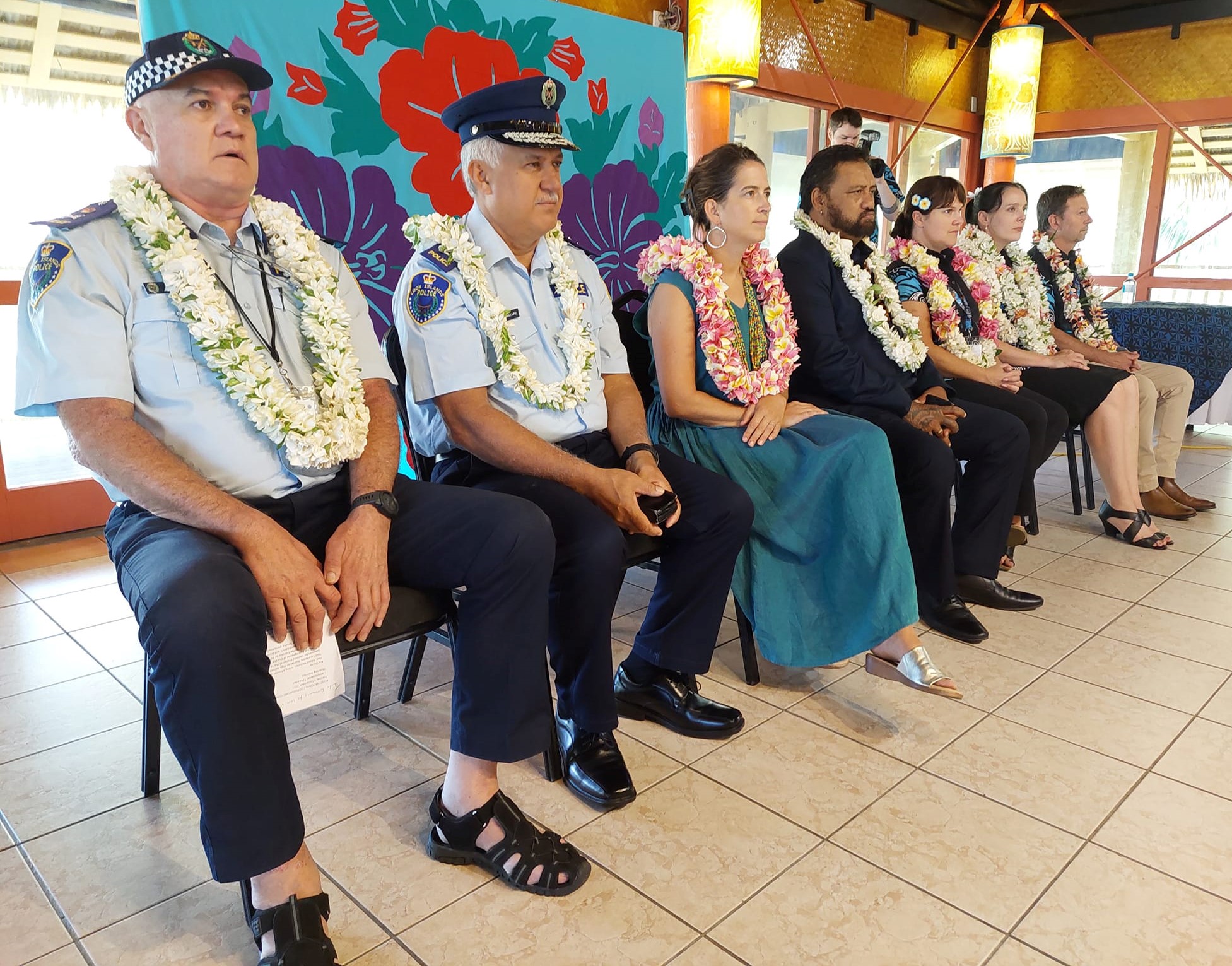Pacific police unite to build networks and capability for a safer region
Wednesday 6 December 2023 | Written by Melina Etches | Published in Economy, National, Pacific Islands, Regional

The Pacific Community for Law Enforcement Cooperation (PCLEC) three-day meeting started yesterday. From Left: Cook Islands Police Commissioner Turepu James Keenan, CIs Deputy Police Commissioner Aka Matapo, Australian High Commissioner Phoebe Smith, Acting Minister of Police Albert Nicholas, D/Superintendent Kat Polkinghorne and Inspector Catherine Tye - both from Australia Federal Police (AFP), Nick Brown, Executive Director of Pacific Islands Chief of Police Secretariat. CIs POLICE/23120518
Fifteen Pacific police agencies are attending the three-day Pacific Community for Law Enforcement Cooperation (PCLEC) meeting to discuss the ongoing development and strengthening of its network.
The PCLEC conference opened yesterday with a cultural turou welcome and dance performance at The Rarotongan Beach Resort & Lagoonarium.
Cook Islands Police Commissioner, Turepu James Keenan, welcomed the guests and participants and encouraged the Pacific family in building connections and mutual partnerships.
Keenan described law enforcement as a major challenge, especially in a tight-knit community like Rarotonga, where the constant pressure to “get it right” puts their capabilities to the test.
He said at times “police back-up comes down to just working with what you’ve got: common-sense practical skill, local knowledge, and a good dose of Pacific ingenuity”. Keenan added working closely with the community and its leaders is therefore vital.
“The highest degrees of transparency and accountability are essential. And a timely responsiveness to our public is paramount.
“For every perfect step we make in delivering on our role, we know all too well that even the smallest of slip-ups can be a stumble too difficult to put right in the eyes of our stakeholders.
“The demands and expectations upon us are high but the tolerance levels are low.”
Keenan stressed that it’s crucial to articulate that police can’t do the job alone.
Cooperative relationships with the community are the supporting backbone of the policing efforts, and the ties that police nurture will bring the rewards for a safer community.
“Regionalism and our partnerships within the Pacific family are an extension of these relationships, at home,” said Keenan.
He noted that the Cook Islands, as well as many of the countries within the realm of the Pacific Islands Chiefs of Police (PICP) organisation, “is contending with an evolving criminal environment – deep within our social structures and across the borders of a vast ocean”.
“Working together for our collective, and individual, security is the platform – not a goal but the established platform – from where we must continue to build on our networks and relationships.”
Keenan also said that sharing resources and information in a cooperative Pacific way can only strengthen our capabilities to secure the region.
He highlighted the theme of discussions “Building Capability through Connection”, saying it speaks to exactly how their individual efforts can be supported, and strengthened.
“Your commitment and proactive approach to seek out and enhance mutual partnerships can bring our Pacific police agencies together in an energised network of formidable strength and capability – one that reinforces our guiding philosophy of – by the Pacific, for the Pacific.”
Keenan acknowledged challenges ahead, but pointed to existing successes, particularly the PCLEC National Coordinators’ network. Their solid achievements, he said, offer a foundation to build upon, and now is the time to strengthen their resolve and collaboratively chart the way forward.
Acting Minister of Police, Albert Nicholas and Australia’s High Commissioner to the Cook Islands Phoebe Smith were special guests.
The PCLEC comprise of 17 countries from around the region, including Australia and Aotearoa New Zealand, who have been praised for their role in supporting collaborative efforts.














































